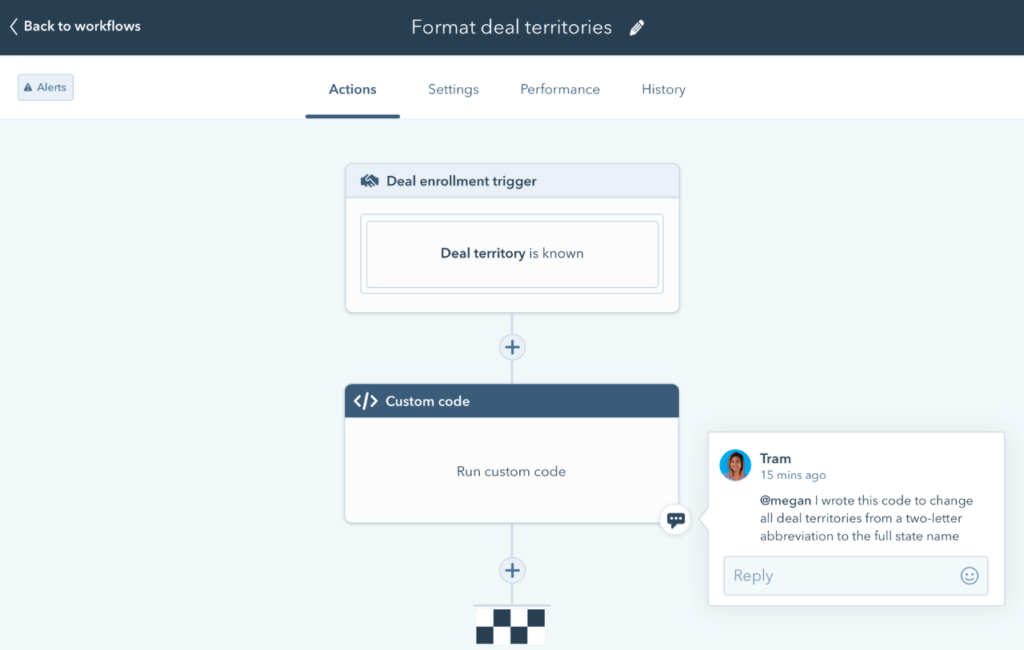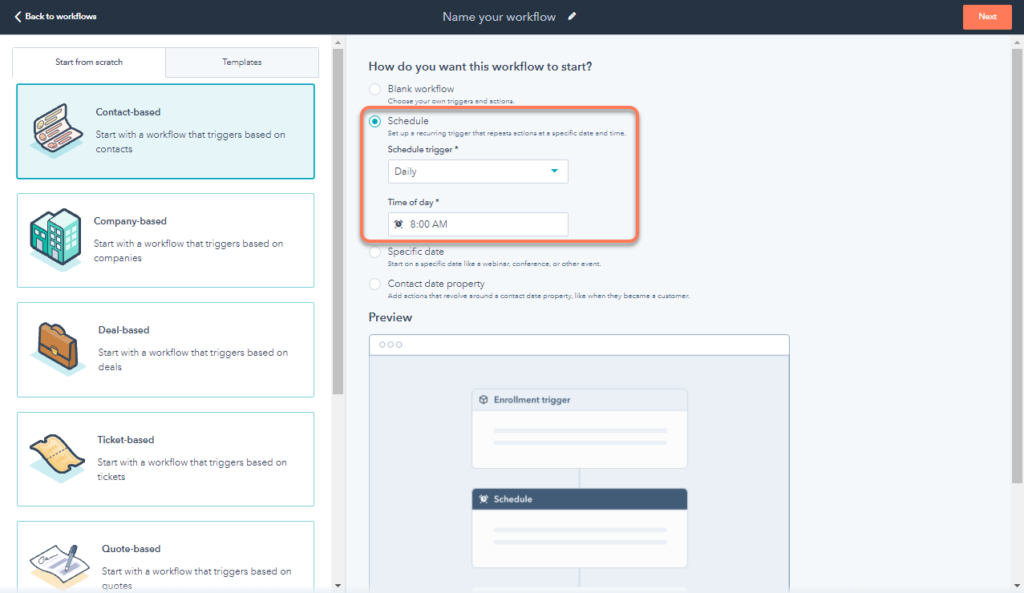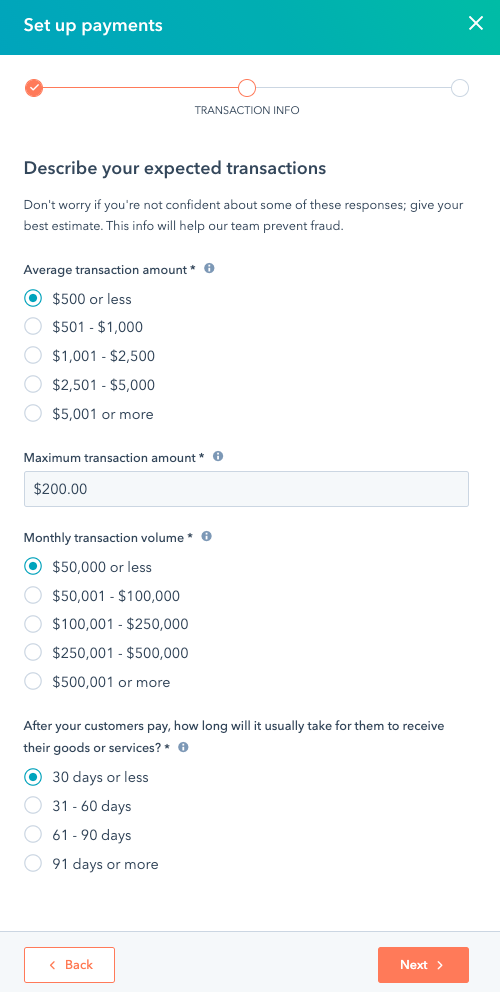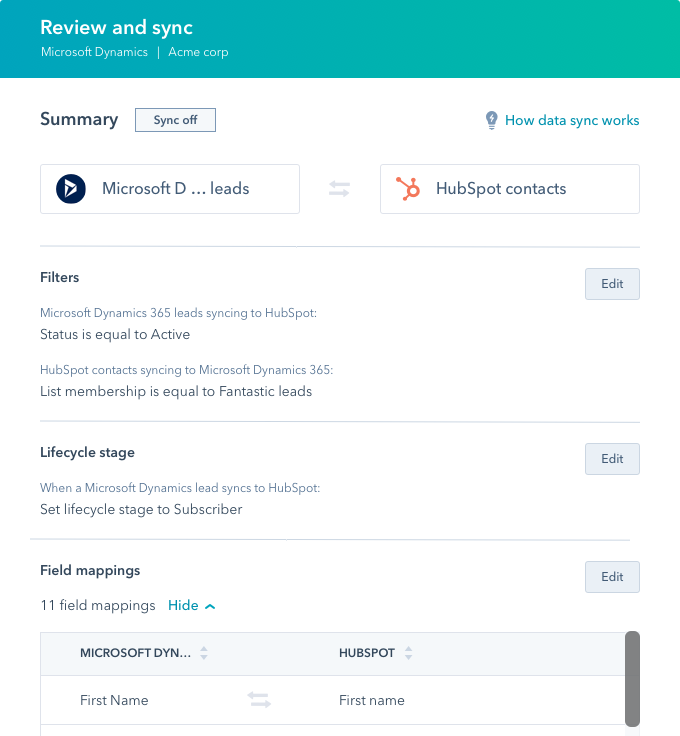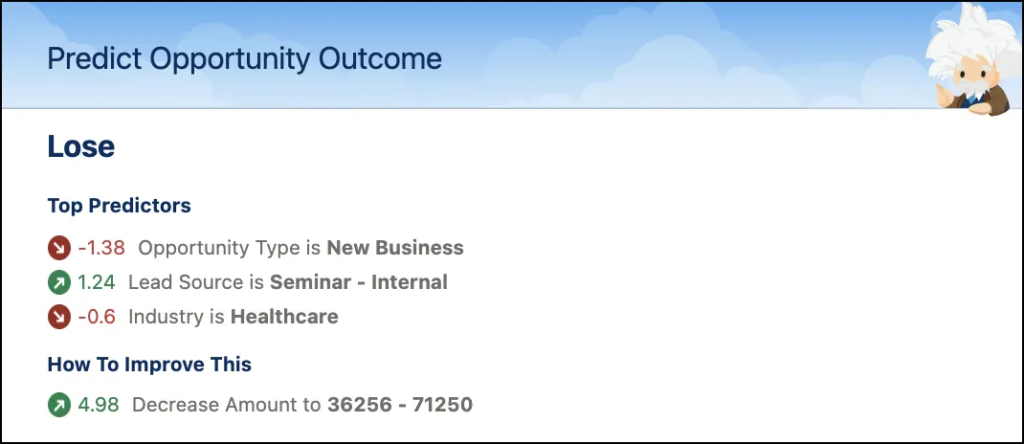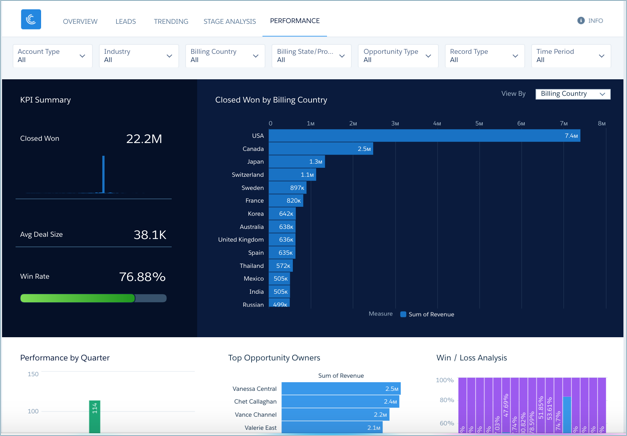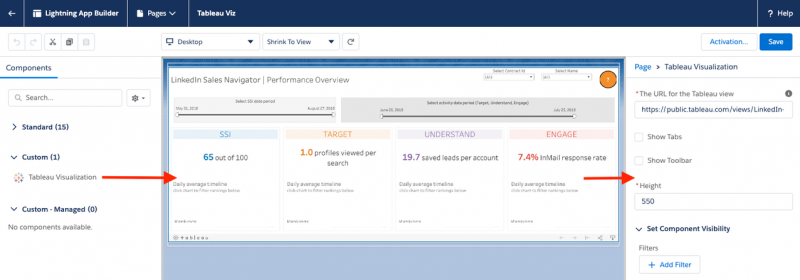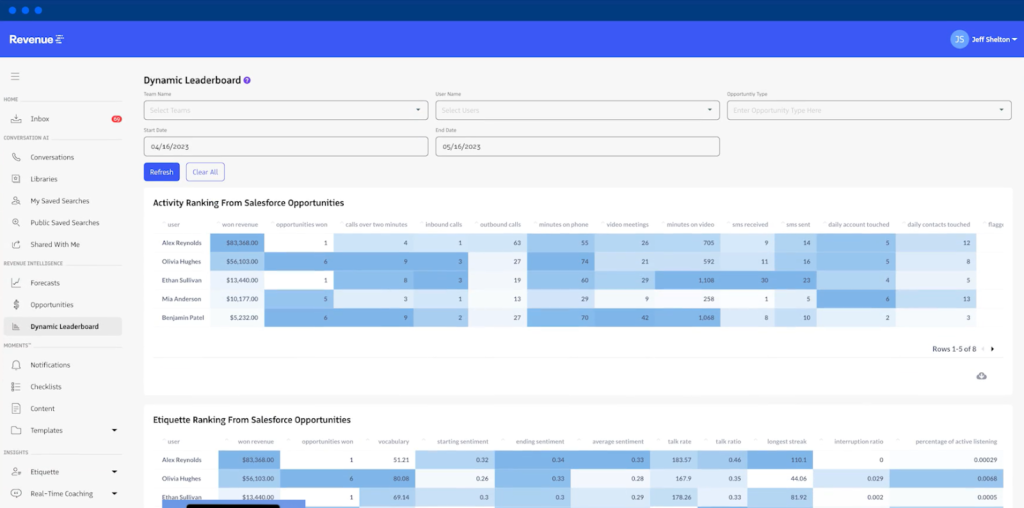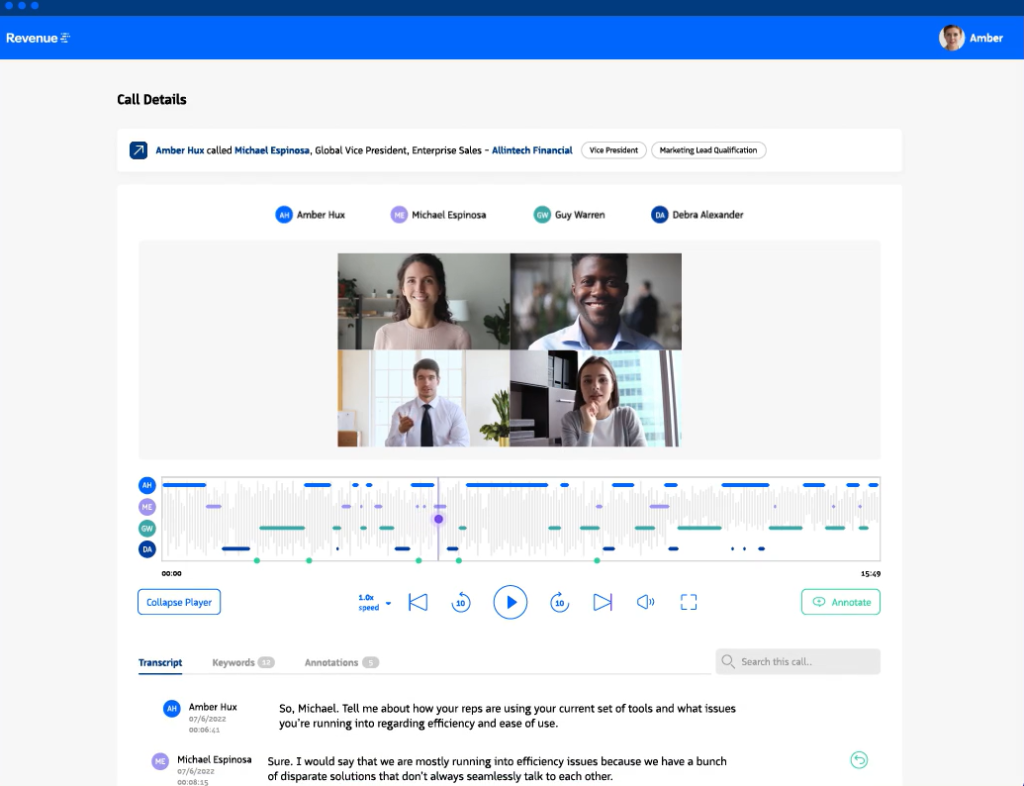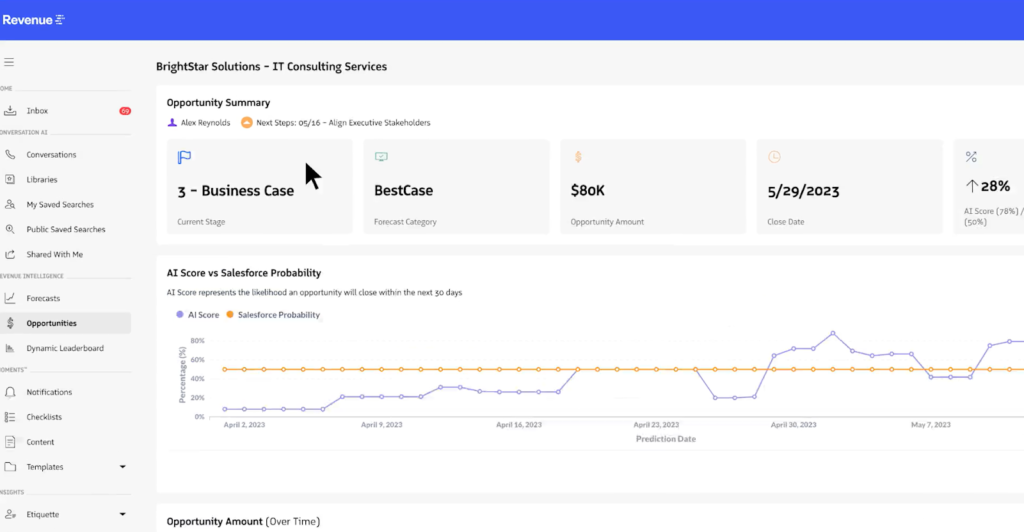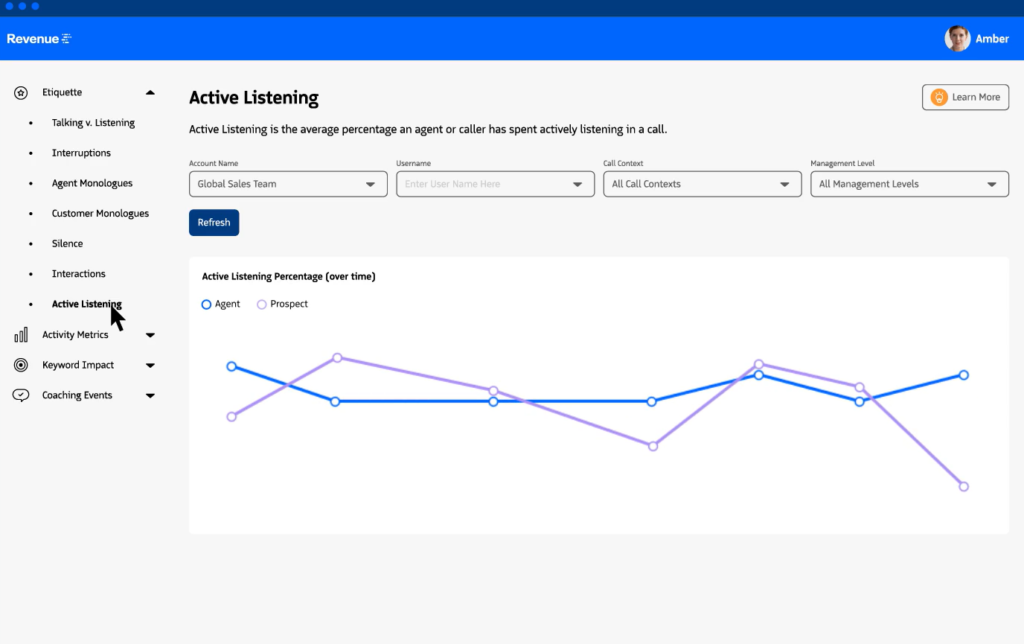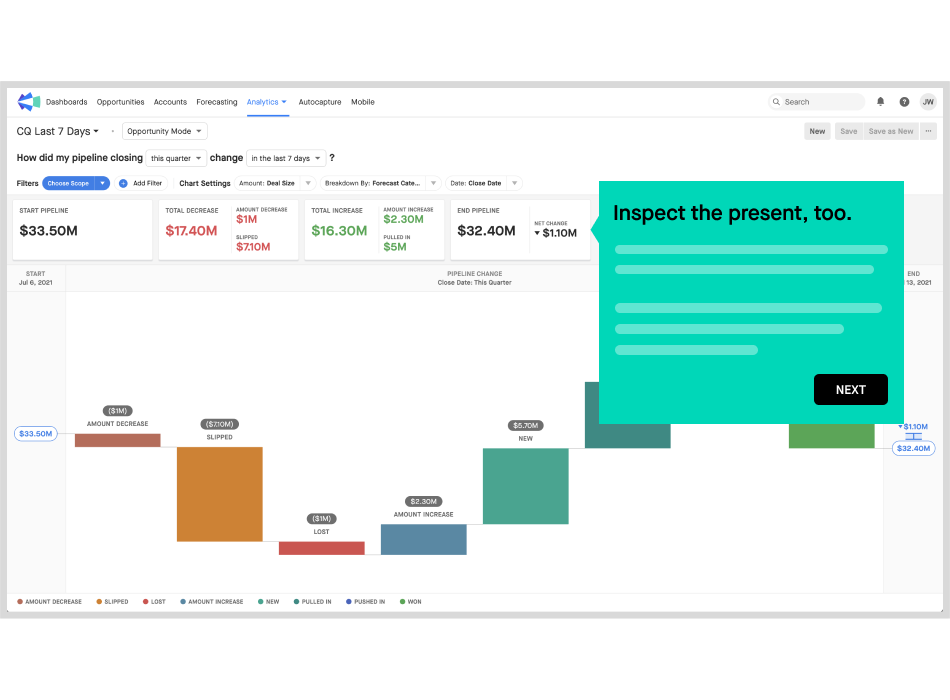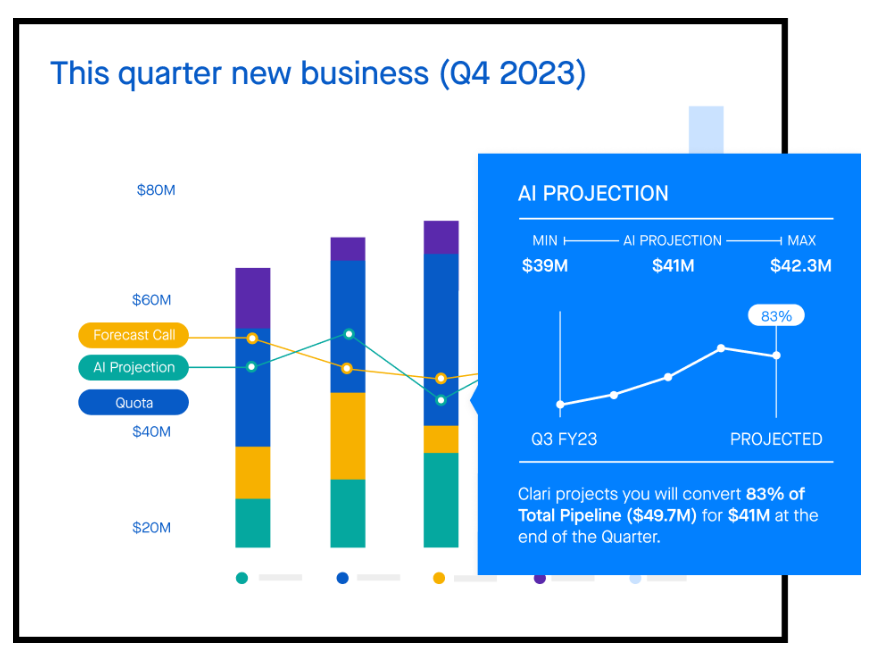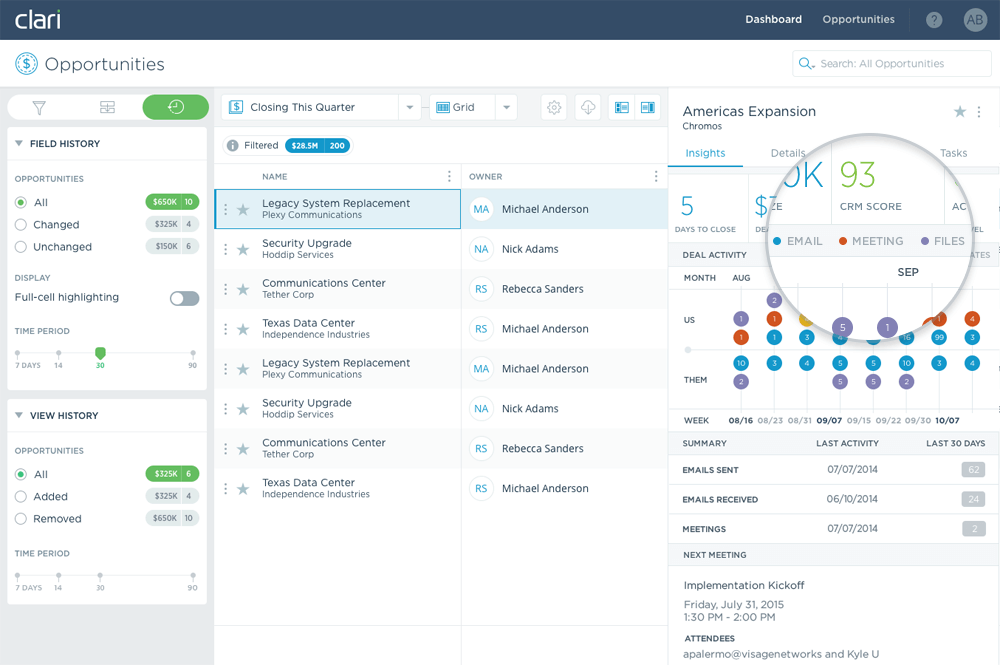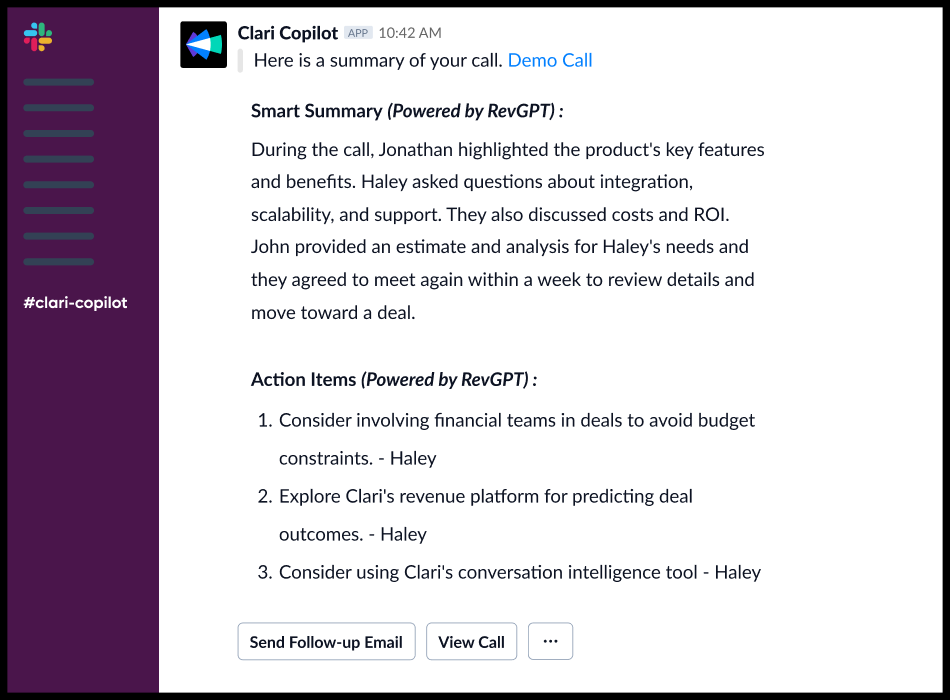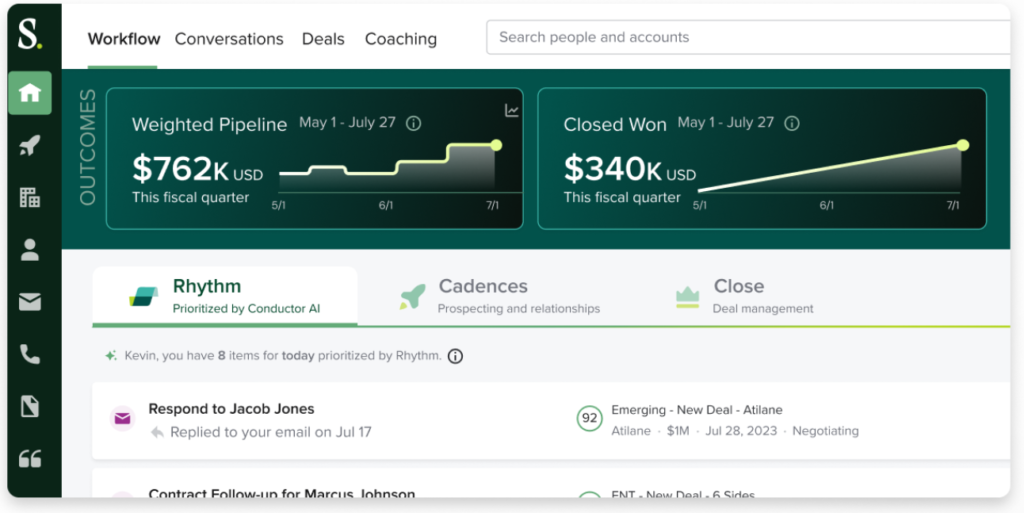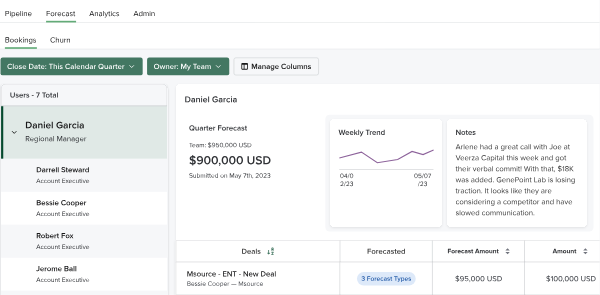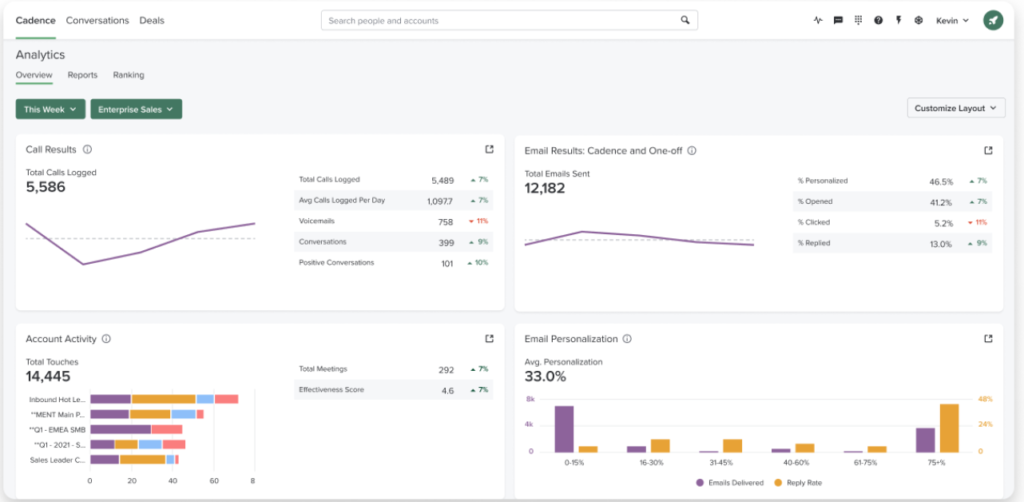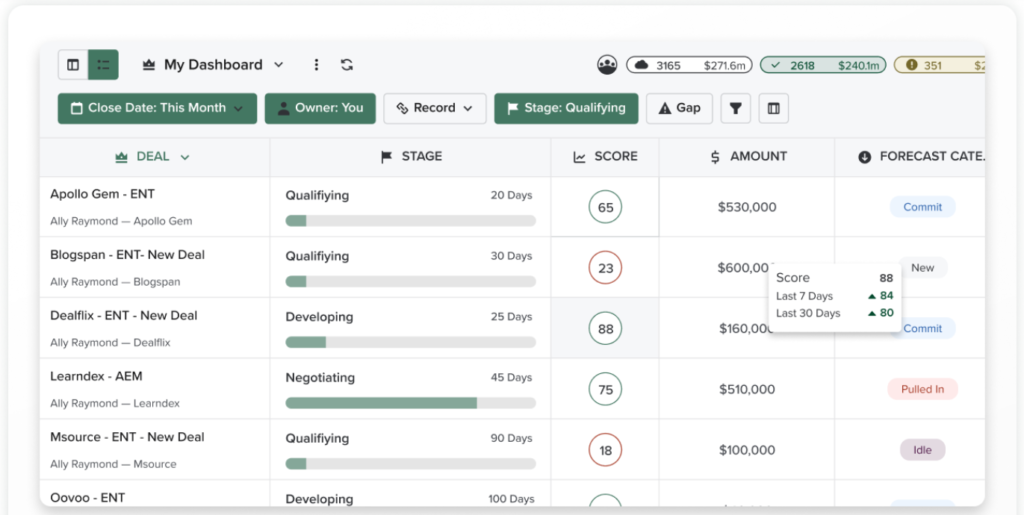Revenue intelligence software is a third-party solution that sales leaders and reps can use to analyze, integrate, and consolidate data from multiple sources to improve sales and revenue generation strategies. This platform is equipped with real-time dashboards, revenue intelligence features like artificial intelligence (AI), and advanced analytics tools to ensure the accuracy of revenue insights, forecasts, and comprehensive reporting for revenue growth.
Our top 5 revenue intelligence software
We have reviewed the most sought revenue intelligence solutions in the market that highly benefit sales teams. Here’s our list of the top 6 best revenue intelligence software platforms:
- HubSpot Operations Hub: Best for programmable automation
- Salesforce CRM Analytics: Best for analyzing sales data powered by AI
- Revenue.io: Best for multichannel sales engagement to drive wins
- Clari: Best for revenue forecasting
- Salesloft: Best for creating revenue workflows
HubSpot Operations Hub: Best for programmable automation
Pros
Cons
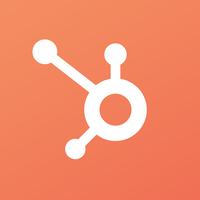
Our Rating: 4.75/5
HubSpot Operations Hub is an operations software program designed to assist sales teams connect and sync apps and customer and company data, as well as automate business processes with its programmable automation. Choose from the four plans available based on your budget and tools needed for revenue intelligence as well as other business operations.
Salesforce CRM Analytics: Best for analyzing sales data powered by AI
Pros
Cons
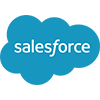
Our Rating: 4.62/5
Salesforce CRM analytics is powered by sales intelligence, empowering sales teams to deliver predictable revenue growth by harnessing AI throughout the customer lifecycle. Salesforce offers six CRM Analytics editions, including the Revenue Intelligence edition with custom-built analytics and AI for sales teams.
Revenue.io: Best for multichannel sales engagement to drive wins
Pros
Cons
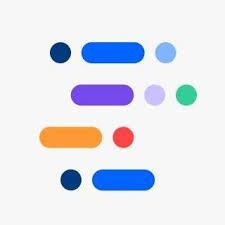
Our Rating: 4.35/5
Revenue.io is a revenue intelligence solution that helps sales teams deliver predictable results and drive more wins through its multichannel sales management features. As sales reps engage with leads and customers, this software automatically captures every call, email, text, and video meeting, converting them into actionable sales insights and next best steps, optimizing a company’s entire revenue operation.
Clari: Best for revenue forecasting
Pros
Cons
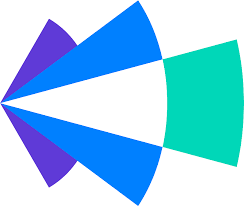
Our Rating: 4.3/5
Clari is the best revenue forecasting platform that helps sales team leaders combine historical performance, deal context, agent input, and purpose-built sales predictions in a centralized view. This revenue intelligence tool promotes intelligent forecast conversations like product or service demand trends among sales teams. Clari lets you create a customized system for your sales team by offering mix-and-match features or modules, improving productivity, predictability, and revenue growth.
Salesloft: Best for creating revenue workflows
Pros
Cons

Our Rating: 4.25/5
Salesloft is an AI-powered revenue orchestration platform that sales teams can use to create revenue workflows. Salesloft recently acquired Drift, a conversational AI and buyer experience company. The combined features enable sales reps to orchestrate a customized, omnichannel buyer journey that increases lifetime value and maximizes revenue.
Key components of revenue intelligence software
Revenue intelligence solutions have the following key components that sales teams can leverage to gain valuable insights into performance and trends to maximize revenue generation.
Artificial intelligence
AI analyzes product or service usage and sales data, allowing sales teams to predict sales opportunities and pipeline outcomes. Sales reps can use AI to predict customer behavior and sales opportunities. It also enhances forecasting accuracy and efficiency.
Here are the most notable AI capabilities of revenue intelligence software:
- Generative AI for suggesting email and chat content, summarizing calls, and condensing sales enablement materials
- Business intelligence for actionable insights derived from AI-collected sales data to inform sales operations and boost revenue
- Predictive and conversational AI for assisting sales reps during lead or customer interactions by providing accurate response suggestions and next best steps
Automation tools
All revenue intelligence platforms have automation capabilities. However, not all providers offer powerful automation tools. Sales teams must identify the areas of sales operations they need to automate before choosing a solution. We recommend finding a revenue intelligence solution that provides you with automation features aligned to your needs and intended applications.
Here are the common automation features of revenue intelligence software:
- Predictive dialing tools for automatically logging and syncing calls, notes, and transcripts to the CRM
- Automated workflows for creating dynamic multi-steps in sales operations to drive higher revenue
- Advanced sales activity and performance capture in real-time for coaching and strategic revenue management
- Real-time notifications for sales reps to receive instant alerts when a lead performs actions that can lead to sales like downloading a whitepaper, reading a buyer’s guide, or signing up for free trial
- Email sync for automatically logging follow-up emails from sales leads who are likely to convert
- Calendar sync for automating the syncing of sales demos and meetings from the calendar to the CRM
Sales cadence management tools
Sales cadence or a series of lead or customer touchpoints, outlines the sequence of actions salespeople must do to close the deal. This capability provides accurate information to sales reps so they can win back lost prospects by regular follow-ups. Sales managers can create expanded sales cadences with omnichannel communications.
Take a look at some sales cadence tools for generating more sales and business revenue:
- Sales sequences for automating a series of timed text messages and emails
- Calling features like call recording to reach prospects and enhance productivity
- Email automation for putting sales cadence management on autopilot
- Drag-and-drop email templates for personalizing emails and SMS
- Split or A/B testing tools for comparing two sales engagement campaign variations
- Analytics to track sales engagement performance metrics like email open rates
CRM integration capabilities
Many CRM and sales software programs have built-in revenue intelligence tools, while some are stand-alone solutions that can be integrated into CRM. Sales teams can integrate their CRM software to third-party apps with revenue intelligence features to create a powerful revenue-generating CRM engine.
Here are the CRM integrations to check when shopping for revenue intelligence software:
- CRM reporting for sales activity tracking for accurate revenue forecasting
- Native CRM integration for billing and payment processing to improve buyer experience
- Email, telephony, social media, and calendar CRM integration for lead nurturing to convert more prospects to loyal, paying customers
Sales revenue management tools
The best revenue intelligence platforms provide reps and managers with sales management tools like pipeline health dashboards to discover opportunities and optimize sales.
The top sales engagement platforms have the following revenue management features:
- Workspaces for account collaboration to determine high revenue-generating sales opportunities
- Task management for assigning sales activities to appropriate sales reps to close more deals
- Account-based engagement to improve lead and customer response rates
- Activity log for generating real-time sales insights and revenue opportunities from calls, emails, text messages, video meetings, and other sales engagement activities
- Template performance features such as call scripts and email templates for following up with sales and product-qualified leads
Benefits of using revenue intelligence software
Revenue intelligence exists with artificial intelligence, collecting data from multiple sources and teams and integrating it into a centralized platform. Sales teams can implement a data-first approach using revenue intelligence software to gain actionable insights into sales processes, metrics, and performance, all geared toward company revenue growth. Take a look below at the benefits of using this software for sales teams.
Automates revenue data capture
Revenue intelligence software resolves siloed data, wherein data gets stored in multiple departments and devices of team members. This tool automates capturing sales data like lead prospecting and nurturing activities as well as win rates, average closed deals, and other key sales metrics affecting revenue. Real-time data capture assists sales managers and reps in making more comprehensive reports, accurate forecasts, and informed decisions.
Uncovers sales opportunities
Inaccurate data hinders sales reps from viewing sales opportunities. Revenue intelligence resolves this problem by providing sales teams insights on lead behavior patterns, buying signals, targeting data, forecasts, and other sales and revenue-generating elements and activities. CRM systems with revenue intelligence tools like AI can be used to prioritize leads and personalize customer communications, generating more business revenue.
Improves productivity
Every sales team follows a standard workflow and uses the same tools to reach common sales goals. However, the way each revenue-generating task is executed by each sales rep differs. With revenue intelligence, sales reps can improve their productivity because everything they need to know for decision making and tools to use is in a centralized platform. Hence, the execution of sales tasks is more streamlined and organized, which positively impacts sales and overall company revenue.
Promotes seamless collaboration
Sales reps have many tasks like lead generation and onboarding new customers, aside from selling. They collaborate with marketing, customer service, and other departments to ensure a smooth buyer transition across the sales process. For this reason, transparent customer interactions are a must, which a revenue intelligence solution can provide. Sales reps can use this tool to monitor and manage customer touchpoints, such as email interactions and calls.
Choosing the best revenue intelligence software
The best revenue intelligence software for sales teams enhance the deal insights, pipeline analytics, sales activity management, and performance monitoring. The primary goal of these platforms is to maximize revenue by leveraging AI and advanced analytics to collect product or service usage data across leads, prospects, and customers.
If you’re looking for a revenue intelligence tool with robust integration and programmable automation, HubSpot Operations Hub is a smart choice. We highly recommend Salesforce CRM analytics if you need in-depth sales data analysis to find more opportunities. On the other hand, Revenue.io can help strengthen your sales engagement strategies to win more deals. Clari has intelligent forecast conversations to optimize sales, while Salesloft is an AI-powered revenue orchestration platform that can significantly improve your sales and revenue workflows.



